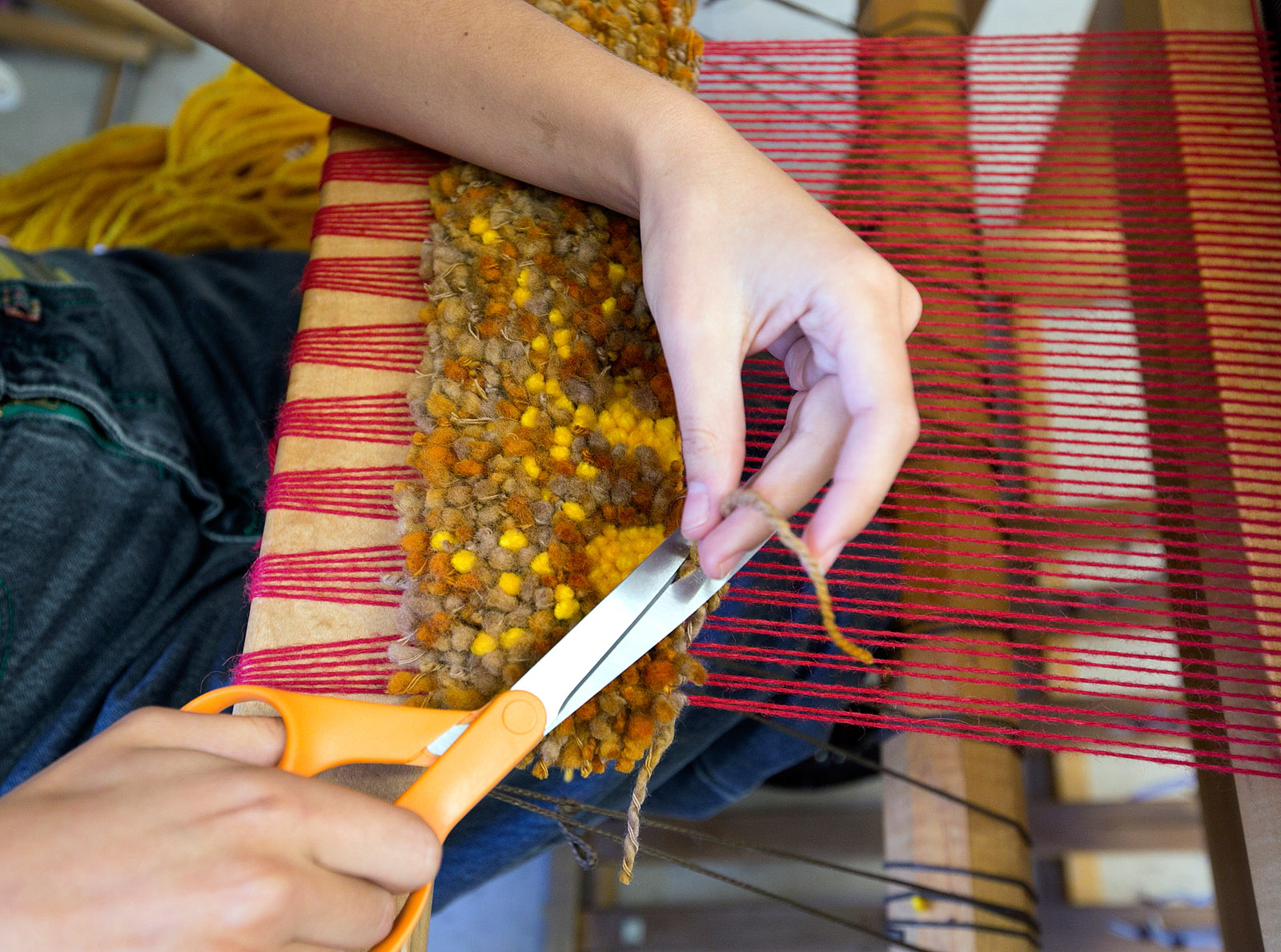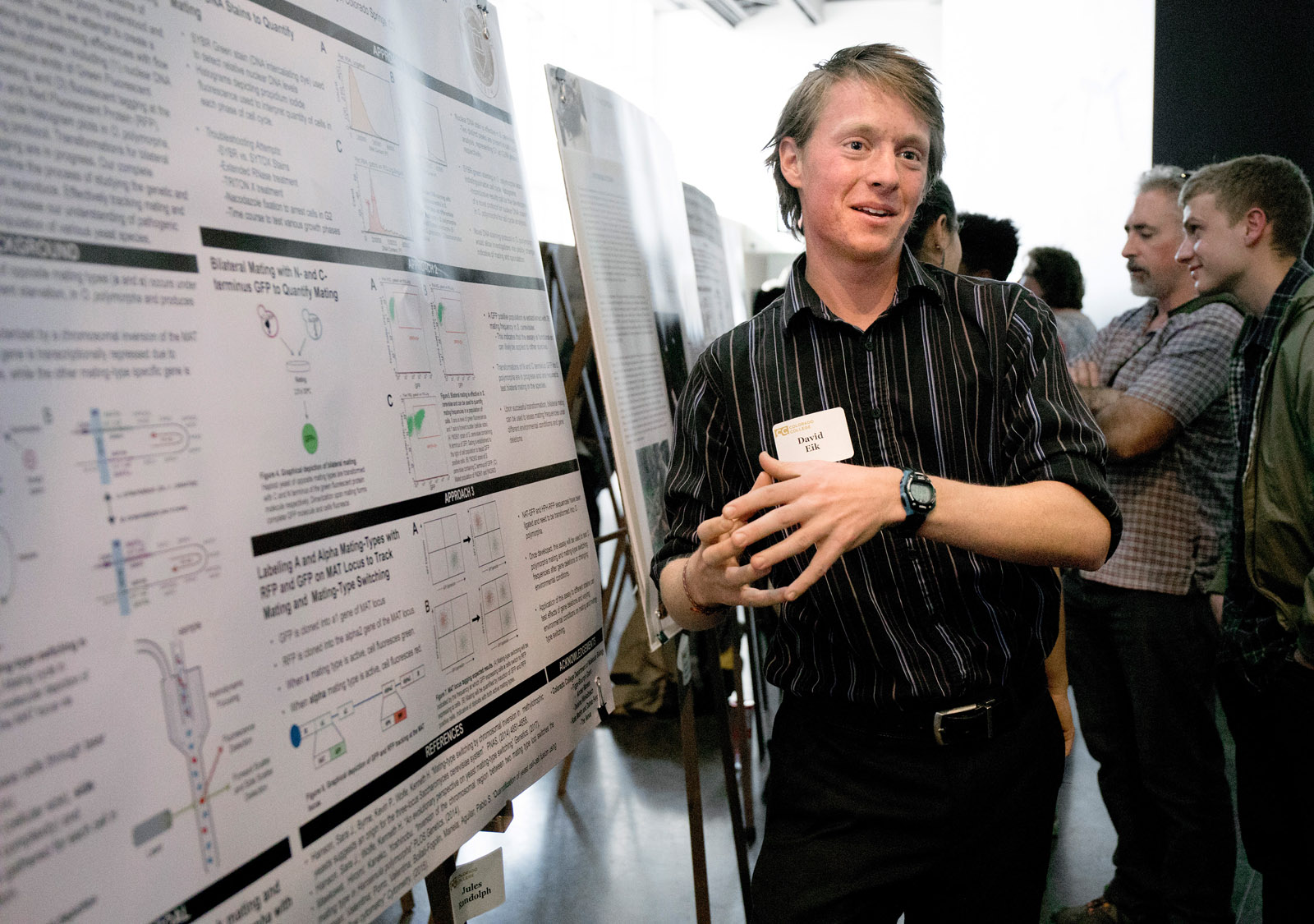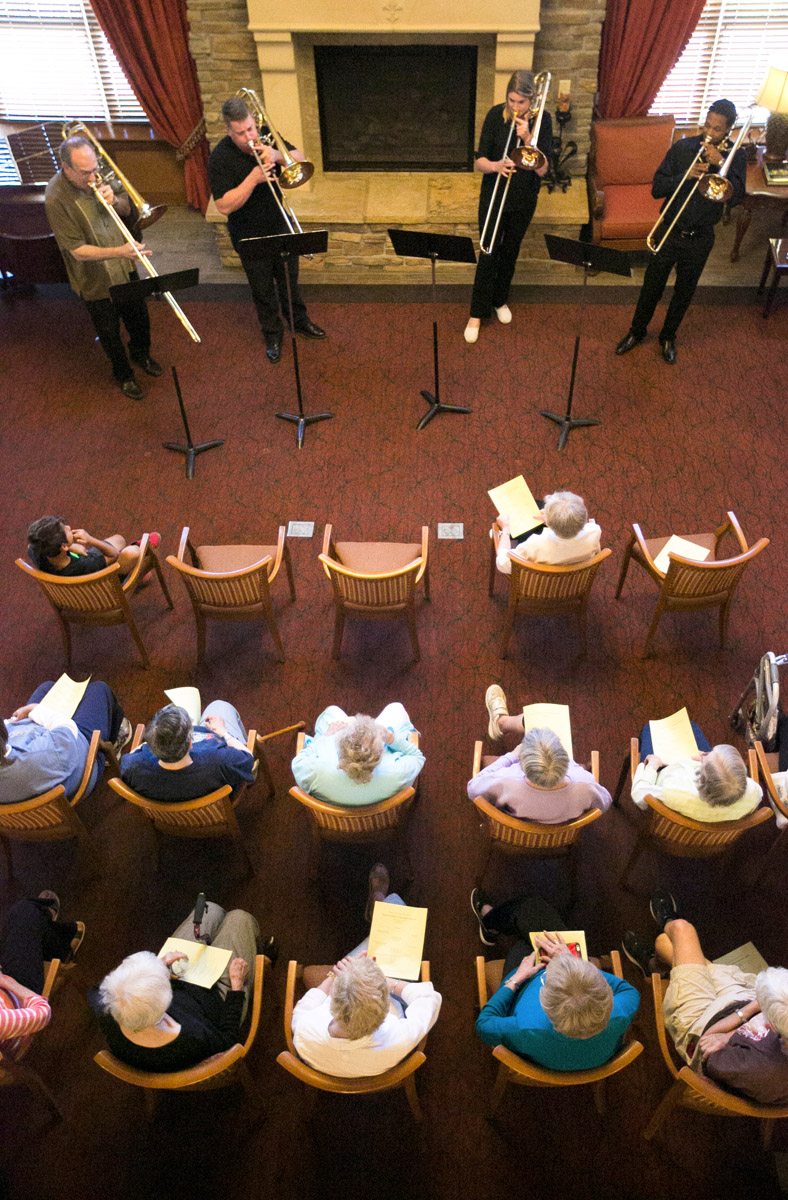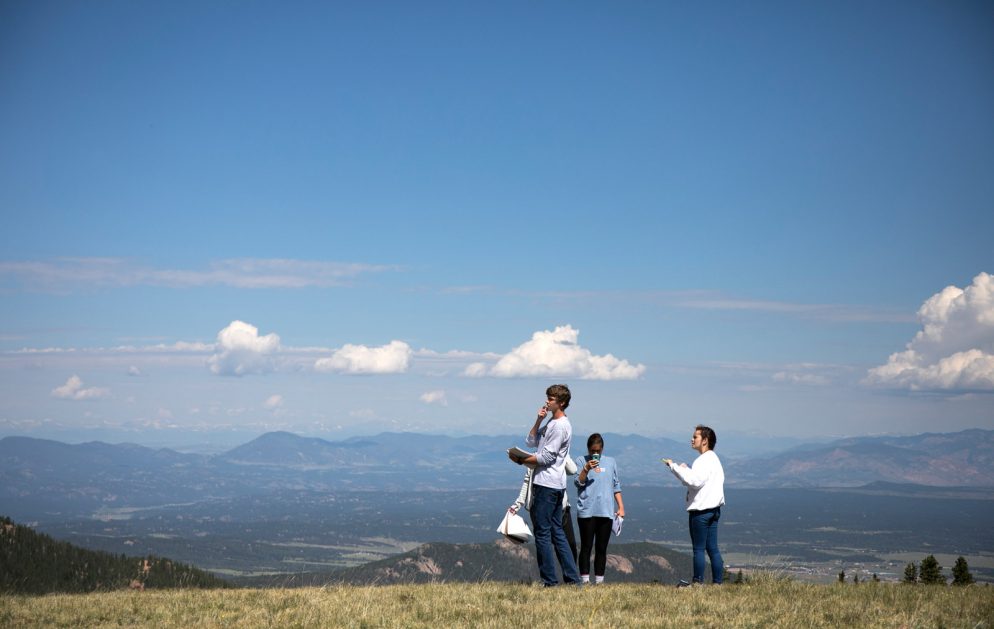
Charlotte Verstraeten ’19, works on a weaving project for Jeanne Steiner’s Fiber Arts Summer Session class. Photo by Jennifer Coombes
There are many intriguing, productive ways one could spend a Colorado College summer:
On a Himalayan Odyssey course, studying the environment, culture, and change in Nepal.
In the Cross-Genre Writing workshop course, writing in a range of styles and genres from prose to spoken word to plays.
In Intro to Museum Studies, exploring how the modern museum is shaped, using the Colorado Springs Fine Arts Center at Colorado College as a learning lab.
Pursuing a research project in collaboration with an esteemed faculty member and preparing to give a professional presentation at the Summer Collaborative Research Symposium.
With opportunities provided by Summer Session courses, the Pre-College Program, student-faculty collaborative research, and a music festival, summer is an exciting time to be at CC.

Students in Mike Taber’s Pre-College Ecology class From Grasslands to Glaciers camped outside of Fairplay, Colorado where they hiked Horseshoe Basin, Mount Sherman and the area to observe, sketch and discuss the rock structures. They also waded into a stream near Four-Mile Creek to observe stream species. Photo by Jennifer Coombes
The Summer Session, which both CC undergraduates and college students from other institutions can attend, consists of summer courses both on campus and off.
“We want to ensure the summer months provide space for students or faculty to pursue new academic opportunities, whether conducting research, taking an elective course outside their major, test-driving a new course, or bolstering an existing course with field work that allows students to enjoy the beautiful summer months in Colorado,” says Jim Burke, director of Summer Session at Colorado College.
“Students have three summers during their time at CC that they can utilize in ways that serve them. We’re here to help them realize that potential,” says Burke.
Burke is helping lead an effort to enhance and expand existing summer programs so that more CC students can benefit, as well as working to attract students from other colleges and even high schools, all in an effort to be a model for other institutions’ summer programs.
One way the Summer Session is looking to improve is by offering more in-demand courses during the summer.
“We’re exploring ‘Can we help students adhere to their academic degree progress by offering wait-listed courses in the summer months?’” says Burke.

David Eik presents his summer research at the SCORE Symposium last summer at Cornerstone Main Space. Photo by Jennifer Coombes
Summer is also good timing for piloting new courses, or innovating ways of offering courses. Burke says they are planning to offer an in-demand GIS evening course this summer.
“Some people have internships, jobs, and research to do, and maybe a 9 a.m. to noon class schedule doesn’t work for them, so we’re piloting different hours for this course. We chose Intro to GIS because there is a lot of interest in GIS from research students and it is relevant to many disciplines,” he says.
Burke and his colleagues also are looking into developing a summer course that would offer an intro to lab skills after students’ first year.
“In order to build a culture of research across disciplines, you have to have an underlying skill set for lab work. In summer, there is an opportunity to offer exposure to lab skills, which could prepare more students for guided research with faculty members,” Burke says.
With all these great opportunities, the icing on the cake is that some part of it, for CC students, could be free.
Every CC student is eligible for one “Wild Card,” which is equal to one free unit of Summer Session tuition during their time here.
According to Burke, about 30 percent of students don’t use their Wild Card. And that’s a real shame.
“At the end of the day, it’s money left on the table. So, students and parents should know about and be using this,” Burke says.
Another aspect of the Summer Session is the Pre-College Program, which is open to rising high school juniors and seniors, and is an opportunity for them to experience rigorous, topical, and stimulating college classes taught by top-notch faculty.

Performers from the various ensembles at the Summer Music Festival traveled to a Colorado Springs assisted living center to perform for residents who might not have the mobility to make it to the festival. The informal performances allowed musicians to talk about the music and their personal journey as performers. Photo by Jennifer Coombes
The high schoolers get a taste of college life, and, more specifically, life at CC on the Block Plan, with classes such as Global Health and International Development, Elementary French, and Probability and Statistics. In the course From Grasslands to Glaciers, Mike Taber, associate professor of education, has students experience and explore the rich natural history of the area. The course focuses on defining climate zones in the Pikes Peak Region from grasslands to woodlands to montane to subalpine to alpine.
According to Burke, high school students who do the Pre-College Program benefit from close access to faculty who are thought-leaders in their fields, something not available at other schools. Pre-College Program participants can take workshops on how to apply to a selective liberal arts college and how to write admission essay, and talk to a senior admission counselor.
“We want to get Pre-College students excited about learning and also cultivate strong candidates for CC,” says Burke.
The college also is pursuing ways of encouraging student-faculty collaborative research experiences. And summer is an opportune time for it. Lisa Schwartz ’03, MAT ’04, student collaborative research program coordinator, says the college is pursuing a comprehensive program to encourage students to participate in research in collaboration with faculty.
Each summer, more than 100 students are engaged in on-campus and off-campus summer research with their faculty mentors.
Psychology Professor Lori Driscoll makes good use of summer student research collaborators in her lab.
“The scientific process often functions best as a community process,” she says. “So much more can be accomplished by several minds and hands than by one. Student/faculty collaborative research is how I build a scientific team. The students begin as trainees, but they become my colleagues. The process simultaneously develops students as scientists and produces a rich intellectual community for me.”
Habiba Vaghoo, associate professor of chemistry and biochemistry, who also collaborates with students on summer research projects, says the experience benefits students in their future careers, regardless of what they go into.
“I think this is an extremely valuable experience as students get a sense of what it means to do research in a particular field,” Vaghoo says. “They have the opportunity to learn new techniques, design experiments, analyze data, and learn how to present it to different audiences. These skills will serve them well regardless of whether they continue in the field or not.”
Abby Wigdale ’18, a studio art major, says doing research in the summer allowed her the breathing room to experiment outside of the academic year when she is more preoccupied with coursework.
“Unlike the Block Plan, an eight-week time frame allots time for trial and error, and experimentation has been vital in exploring how to incorporate new technologies into traditional intaglio printmaking,” Wigdale says.
The research opportunity culminates with the Summer Collaborative Research Symposium, held each year in the fall. SCoRe, as the symposium is known, celebrates the research collaborations and accomplishments of students and faculty. This year’s symposium will be Sept. 28, on the Friday of Family and Friends Weekend.
But, summers are also about fun, culture, and rejuvenation. No worries. CC has that covered.
June marks the 34th season for the Colorado College Summer Music Festival, and the world-wide recognition of the festival continues to grow. More than 25 percent of the applicants this year — some of the top pre-professional musicians in the world — hail from countries as far flung as Australia, Kazakhstan, Vietnam, and Guatemala. Pair these exceptional fellows with some of the top educators and performers working today (with 11 Grammy nominations and two wins among them) and it is easy to see why this has become one of the premier festivals in the country.
In addition to bringing traditional and contemporary classical music to the stage, on June 11, the festival will bring Grammy-nominated, two-time Mandolinist of the Year Sierra Hull back to CC for a concert that will also feature CC’s Bluegrass Ensemble director Keith Reed with a few of their celebrity Nashville friends. On June 17, the festival hosts “The Jazz Age – the Suspenseful, the Surreal, and the Silly,” three early silent films accompanied live by San Francisco composer and jazz pianist Stephen Prutsman and a selection of festival faculty and fellows.
CC students attend all events for free, and CC ID holders are also offered discounted tickets. More information, including a full schedule of events, can be found on the Summer Music Festival website.
